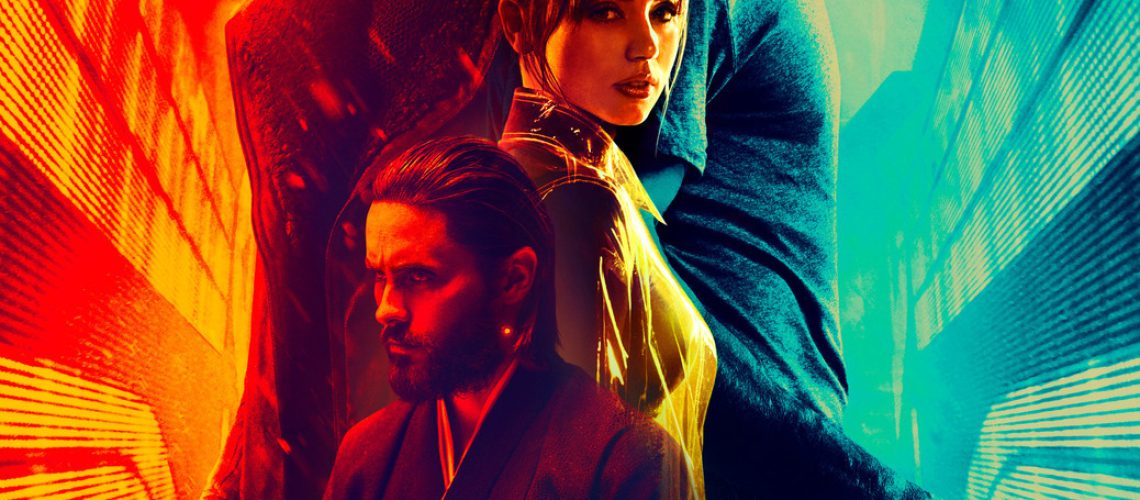I can’t remember ever being as disturbed and enthralled at one time by any movie as by “Blade Runner 2049.” That makes it fine art in my eyes.
The movie is disturbing because it so explicitly poses questions about personhood, objectification and empathy. I gasped a few times and flinched several more times, and so did my companion. Besides the consent issues, the violence in it is also disturbing, and this vision of 2049 is even more dystopic for PoC and women; however, I saw those elements not as gratuitous, but rather as deliberate showcasing of the problems of society. I’ll discuss that more after the spoiler warning.
The movie is enthralling because it is so well done. I said before that it “poses” questions instead of “asks” them, because aside from some brief future-history infodumping, there is a whole lot of show-not-tell in this movie, the opposite of the much-derided voiceover in the 1982 movie’s theatrical version. I suppose a person who’s oblivious to social issues could take everything that happens at face value, as though the viewer is supposed to be okay with the situations and choices being shown, but it seems obvious that a person who thinks about them is supposed to be cringing.
Anyway, a person who just wants to watch a futuristic detective/action thriller is going to be bored with this movie. It is not afraid to take its time, totaling 2 hours and 43 minutes; however, I did not feel that any of that time is wasted. The moments when it’s just silently showing what what people are feeling are part of the storytelling, and even the transit times are valuable, both in worldbuilding through scenery and in giving the viewer time for some recovery and processing in between the emotional and philosophical gut-punches. I used the word “immersive” to describe Arrival last year, and I felt immersed in this story, too. Sink into it like a dream … or a memory.
As for visuals, do try to see the movie in IMAX or PDX or whatever enhanced format is available. If you see it in lower resolution or a smaller screen, you’ll lose some details and some of the mood. The city is appropriately grimy and foul, and the wasteland/wrecked cityscapes are eerily desolate. What I can only call the temple of technology is gorgeous, which makes the things that happen in it all the more horrible.
The music isn’t Vangelis, no, and I’m not tempted to buy the soundtrack. However, it did its job in setting the tone, and at the end, a certain thematic callback brought tears to my eyes.
It is important to have seen the 1982 movie sometime before seeing this one. I think viewers could understand the sequel on its own, but then they would miss all the resonances with the first one. BR 2049 not only continues the story, it also is in dialogue with it, expanding it, enhancing it, and reflecting on it.
There are some plot holes that I didn’t worry about until after the movie, one about a person’s motivations and a couple related to carelessness by fugitives. One thing I don’t understand about the Bladerunner world is why replicants aren’t manufactured with locator-beacons implanted in their spines. But I forgive the franchise for those little irritants, since it’s so very effective at the other things it does.
And now, SPOILER TERRITORY!
WARNING: From here on, I’ll be discussing plot points to some extent. If you want to see Blade Runner 2049 without knowing any specifics, please stop reading.
Be aware, this is a dystopia. The essential awfulness of manufacturing sentient beings as slaves has been extended, with the later generations of replicants since “2019” (the original’s timeframe) having had even the capacity to rebel engineered out of them (and even escaping and hiding is rebellion). Blade Runner K (the first letter in his serial number) seems almost proud of this fact as he explains to a fugitive replicant that this lack means he’s not killing “his own people” after all. … although later events cast that into doubt. Maybe they can’t rebel, but they can certainly — malfunction? go bad? — go off track, or else K wouldn’t need to be tested against his baseline after coming in from a mission.
Replicants aren’t the only ones with consent issues, however. K has an AI companion at home to cook his dinner and keep him company, who appears as a female hologram. It’s not clear whether Joi is really sentient or if it’s just a program that’s very good at anticipating K’s needs and trying to be as real as possible for his sake. At one point Joi hires a prostitute for K and overlays the woman with her hologram; the AI and the prostitute both tell each other at various times to just Be Quiet and perform their designated functions, reinforcing each other’s status as tools. The prostitute, by the way, is named Mariette, and I take this as a shortened form of Marionette. Almost everyone in this movie is just a puppet for the powerful, but women are particularly vulnerable here.
Yes, both men and women die, but while both male and female characters are killed for rebellion or inconvenience or knowing too much, females are also killed, suddenly and cruelly, fresh out of the gestation tubes or nearly so, just for not quite measuring up to their creators’ needs. Of course there’s plenty of female nudity but not much male beefcake on display. And men have a lot more agency, making their own decisions, but women are acting as men’s agents, or serving the system, and the female rebel leader says she’s just waiting for the real rebel leader to arise (and that person has been lied to, lifelong, too). Even though a huge plot point hinges on motherhood, what’s most important about that is whether one ultra-rich, ultra-powerful man will be able to seize more control to advance his goals.
That man is a white man, of course. Very few people of color have speaking parts in BR 2049, and none of them — as far as I can tell — are in positions of authority; even the background characters are visually far less diverse than in the original film. When the cataclysm between the movies happened, did white people get preferentially saved? Did something even more sinister happen? We don’t get even a throwaway line of explanation.
You can make up your own mind whether all this is due to unconscious sexism and racism from the writers and director, and/or an artistic choice projecting a further devolution of the dystopia of the original film. But while I did enjoy the semi-subversion of the male savior trope, and how Deckard spent a significant part of the movie chained up and waiting to be rescued, I enjoyed nothing about the diminution of diversity in this movie.
While I wouldn’t call it a perfect film, I maintain that it’s an amazing movie. As a sequel, “Blade Runner 2049” could hardly be as breathtakingly groundbreaking as the original, especially since other SF films (and many books) have been continuing to explore issues of personhood and exploitation in the interim. But that’s not what it seems to be aiming at anyway. What it does achieve masterfully well is to continue the conversation from the first film in a beautifully appalling way, reminding viewers that those who are deemed subhuman and insignificant may still be people in every significant way. You can keep refining the tests and moving the goalposts for who gets to matter or make decisions or be seen as one of you, but only at the risk of losing your own humanity.









0 Responses
“You can keep refining the tests and moving the goalposts for who gets to matter or make decisions or be seen as one of you, but only at the risk of losing your own humanity.” Great ending quote, applies way beyond the movie.